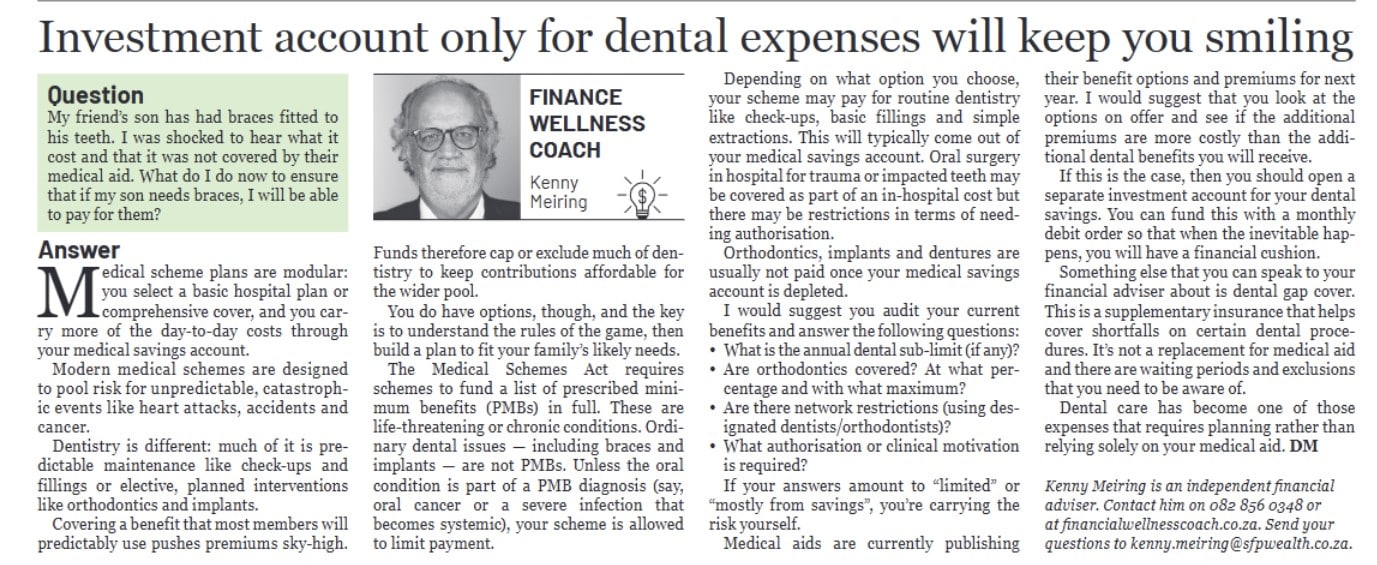No. 230 – Investment account only for dental expenses will keep you smiling
Question
My friend’s son has had braces fitted to his teeth. I was shocked to hear what it cost and that it was not covered by their medical aid. What do I do now to ensure that if my son needs braces, I will be able to pay for them?
Answer
Years ago, many employees belonged to big, employer-sponsored medical aids with standard premiums and generous annual allowances for spectacles, hearing aids, orthodontics and dentures. Cross-subsidisation quietly helped families with higher dental needs so those with no children, effectively subsidised those families with teenagers than needed braces.
That world has changed. Today, many of us work for ourselves, change jobs frequently, and choose our own medical schemes.
Plans are modular: you select a basic hospital plan or comprehensive cover, and you carry more of the day-to-day costs through your medical savings account.
Modern medical schemes are designed to pool risk for unpredictable, catastrophic events like heart attacks, accidents and cancer. Dentistry is different: much of it is predictable maintenance like check-ups and fillings or elective, planned interventions like orthodontics and implants. Insuring a benefit that most members will predictably use pushes premiums sky-high. Funds therefore cap or exclude much of dentistry to keep contributions affordable for the wider pool.
This isn’t a moral failing by your scheme; it comes from how our system was designed and the practical economics of insuring something that almost everyone will need at some point.
You do have options though and the key is to understand the rules of the game, then build a plan that fits your family’s likely needs.
The Medical Schemes Act requires schemes to fund a list of Prescribed Minimum Benefits (PMBs) in full. These are life-threatening or chronic conditions. Ordinary dental issues — including braces and implants — are not PMBs. Unless the oral condition is part of a PMB diagnosis (say, oral cancer or a severe infection that becomes systemic), your scheme is allowed to limit payment.
When it comes to medical aids it is important to understand the options
- A basic hospital plan protects you for big hospital events but leaves day-to-day dentistry to you.
- A comprehensive option may include enhanced dental benefits — but expect strict rules and co-payments.
- A medical savings plan (inside many options) is not insurance; it’s your money in a wallet administered by the scheme. Once you’ve used it, there’s nothing left for dental unless your option has separate benefits
Depending in what option you choose, your scheme may pay for routine dentistry like check-ups, basic fillings and simple extractions. This will typically come out of your medical savings account. Oral surgery in hospital for trauma or impacted teeth may be covered as part of an in-hospital cost but there may be restrictions in terms of needing authorisation.
Orthodontics, implants and dentures are usually not paid once your medical savings account is depleted.
I would suggest that you audit your current benefits and answer the following questions
- What is the annual dental sub-limit (if any)?
- Are orthodontics covered? At what percentage and with what maximum?
- Are there network restrictions (using designated dentists/orthodontists)?
- What authorisation or clinical motivation is required?
If your answers amount to “limited” or “mostly from savings”, you’re carrying the risk yourself.
You should then look at what options are open to you. Medical aids are currently publishing their benefit options and premiums for next year. I would suggest that you look at the options on offer and see if the additional premiums are more costly than the additional dental benefits you will receive.
If this is the case, then you should open a separate investment account and call it Dental Savings. You can then fund this with a monthly debit order so that when the inevitable happens, you will have a financial cushion.
Something else that you can speak to your financial advisor about is dental gap cover. This is a supplementary insurance that helps cover shortfalls on certain dental procedures. It’s not a replacement for medical aid and there waiting periods and exclusions that you need to be aware of.
Dental care has become one of those expenses that requires planning rather than relying solely on your medical aid. Modern schemes are designed to handle emergencies and major illnesses, not predictable treatments like braces or implants. The best approach is to understand what your plan truly covers, save separately for future dental costs, and explore options such as dental gap cover or comprehensive upgrades. With a bit of preparation, you can protect both your family’s smiles and your financial wellbeing.
KENNY MEIRING IS AN INDEPENDENT FINANCIAL ADVISER
Contact him via phone, email or via contact phone on the financialwellnesscoach.co.za website

Read more of our articles on the Daily Maverick website or newspaper weekly!
